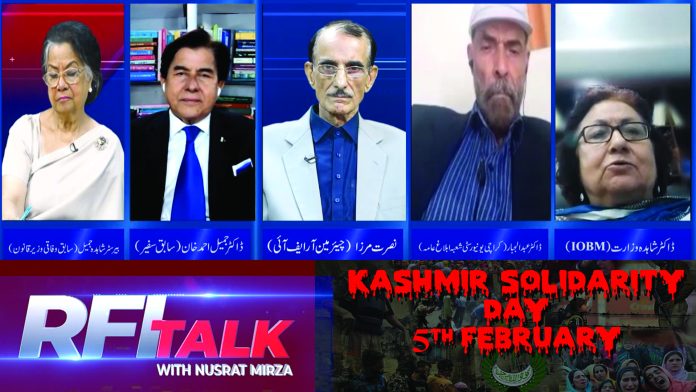On August 5th, Rabita Forum International (RFI) held a significant digital show to mark Kashmir Solidarity Day. The event featured prominent intellectuals including Barrister Shahida Jameel, a former Law Minister; Ambassador (R) Dr. Jameel Ahmed Khan; Prof. Dr. Shahida Wizarat, Dean of the Department of Social Sciences at IOBM; and Dr. Abdul Jabbar, from the Department of Mass Communication at the University of Karachi.
Barrister Shahida Jameel began the discussion by condemning India’s actions in Kashmir, stating that the revocation of Articles 370 and 35A by the Modi government was a deliberate attempt to alter the region’s demographic makeup, paving the way for a manipulated referendum. She stressed that India has not only ignored United Nations resolutions but has also violated its own constitution. Jameel pointed out that Quaid-e-Azam had foreseen this deceptive strategy and warned against it. She also criticized Pakistan’s lack of a strong response, suggesting that a more forceful reaction could have pressured India to retreat from its aggressive policies. Ambassador Jameel Ahmed Khan highlighted the international community’s silence on India’s constitutional violations.
He mentioned that Pakistan had submitted a 131-page dossier to the United Nations detailing India’s human rights abuses and violations of international law, yet received insufficient support from Muslim-majority countries. Khan argued that Pakistan’s diplomatic tools are outdated and inadequate to address the challenges of the current geopolitical landscape.
He also noted that the abrogation of Article 35A violates Article 49 of the Geneva Convention, yet India’s status as a regional power has earned it favor from the United States and other global powers. He suggested that increased resistance from Kashmiris might be the only viable way forward to end India’s illegal occupation.
Dr. Shahida Wizarat added that both the people of Kashmir and Pakistan have rejected India’s illegal actions. She emphasized the need for Pakistan to restructure its system, reduce foreign influence in its internal affairs, and revamp its foreign policy to better address the Kashmir issue.
Dr. Abdul Jabbar suggested that Pakistan’s foreign office should adopt a more research-based approach, drawing inspiration from Russia’s strategy in Ukraine, to effectively address the Kashmir conflict. He advocated for strengthening ties with Russia and China to secure their support in the Kashmir cause. Host Nusrat Mirza concluded the session by emphasizing the need for Pakistan to intensify its efforts on legal, diplomatic, and political fronts to expose India’s actions and secure freedom for the Kashmiri people. He stressed that these efforts are crucial to ensuring that the international community recognizes and supports the Kashmiris’ right to self-determination.










